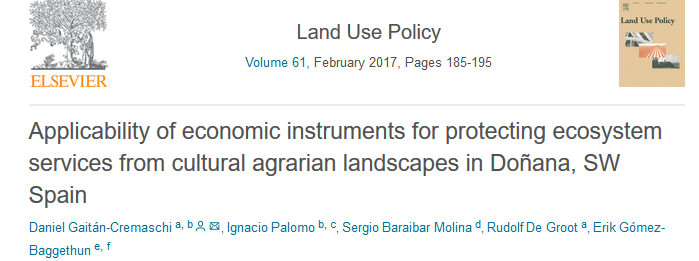BC3 Journal Article “Applicability of economic instruments for protecting ecosystem services from cultural agrarian landscapes in Doñana, SW Spain”


Go to external source
Gaitán-Cremaschi, D., Palomo, I., Molina, S. B., De Groot, R., & Gómez-Baggethun, E. 2017. Applicability of economic instruments for protecting ecosystem services from cultural agrarian landscapes in Doñana, SW Spain. Land Use Policy. 61. 185-195. DOI (10.1016/j.landusepol.2016.11.011).
Abstract
Abandonment and conversion of cultural agrarian landscapes are major drivers behind the loss of ecosystem services in Europe. One incentive for land-use conversion is the higher (private) economic return from industrial mono-functional crops relative to traditional multi-functional ones. However, conversion of cultural agrarian landscapes can involve high direct and indirect costs to society through the loss of ecosystem services. Using as a case study the traditional vineyards surrounding the Doñana National Park, South-West Spain, this research has three objectives: i) to measure soil erosion impacts from the conversion of traditional vineyards in biophysical and economic terms, (ii) to identify drivers of change behind the loss of traditional vineyards, and iii) to assess the applicability of economic instruments to protect traditional vineyards. Our results suggest that uprooting of traditional vineyards is an important driver behind the siltation of the marsh in the Doñana National Park, which in turns involve socio-environmental costs in terms of loss of ecosystem services and cultural values. Subsidy reform to reward management practices that sustain ecosystem services and eco-labelling of vine-derived products are pointed at as promising economic instruments to slow down or reverse abandonment or conversion of traditional vineyards.
